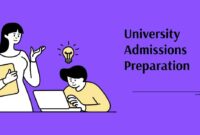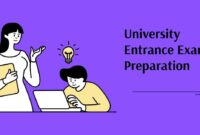Sarah stared at the university admission letter in her hands, tears streaming down her face. After months of intense college admission preparation, sleepless nights, and countless practice tests, she had finally received acceptance to her dream university in London.
What made the difference? She started preparing early and followed a structured approach that we’ll share with you today.
Getting into your desired university might seem overwhelming, but with the right preparation strategy, you can transform this challenge into an achievable goal. This comprehensive guide will walk you through every essential step of preparing for university admission, from understanding entrance requirements to mastering your application materials.
Understanding University Admission Requirements
Before diving into preparation, you need to understand what universities actually look for in applicants. Each institution has specific criteria that form the foundation of their selection process.
1. Academic Performance Standards
Your academic record serves as the primary indicator of your readiness for higher education. Universities typically examine your grades from the past 2-3 years, focusing on subjects relevant to your chosen field of study.
Most European universities require specific grade thresholds. For example, UK universities often look for A-level grades ranging from AAA to BBB, depending on the institution and program. German universities may require an Abitur with grades between 1.0 and 3.0, while French institutions might expect high marks in the Baccalauréat.
Keep detailed records of all your academic achievements, including certificates, transcripts, and any additional qualifications you’ve earned. This documentation becomes crucial during your higher education admission planning phase.
2. Language Proficiency Requirements
Since you’re targeting European universities, language skills play a vital role in your admission success. Many programs require proof of English proficiency through standardized tests like IELTS or TOEFL.
For non-English speaking countries, you might need to demonstrate proficiency in the local language. German universities often require TestDaF or DSH certificates, while French institutions may ask for DELF or DALF qualifications.
Start preparing for language tests at least 6-8 months before your application deadline. This timeframe allows you to retake tests if needed and achieve your target scores.
3. Standardized Test Scores
Many universities require specific entrance examinations as part of their university entrance exam readiness assessment. These tests evaluate your knowledge in core subjects and critical thinking abilities.
Common standardized tests include SATs for American-style programs, A-levels for UK universities, and country-specific examinations like the German Abitur or French Baccalauréat. Some programs also require subject-specific tests in mathematics, sciences, or humanities.
Research the specific test requirements for your target universities and programs early in your preparation process. This information helps you create a focused study timeline and identify areas where you need additional support.
Creating Your Admission Timeline
Effective university selection process prep requires careful planning and time management. Starting your preparation at the right time can significantly impact your success rate.
1. Two Years Before Application
Begin your serious preparation during your second-to-last year of secondary school. This early start gives you ample time to address any academic weaknesses and build a strong foundation.
Focus on maintaining excellent grades in core subjects related to your intended field of study. If you’re planning to study engineering, prioritize mathematics and physics. For business programs, emphasize economics, mathematics, and languages.
Start researching universities and their specific requirements during this period. Create a preliminary list of 10-15 institutions that align with your academic goals and interests.
2. One Year Before Application
Your final year of secondary school is crucial for college application readiness. This is when you’ll take most standardized tests, finalize your university list, and begin drafting application materials.
Register for required standardized tests and language proficiency examinations. Many tests are offered multiple times per year, so choose dates that allow for retakes if necessary.
Begin working on your personal statement or motivation letter. These documents require multiple drafts and revisions, so starting early ensures you can craft compelling narratives about your academic journey and future goals.
3. Application Period
Most European universities have application deadlines between December and March for the following academic year. Submit all materials well before these deadlines to avoid technical issues or missing documents.
Double-check all requirements for each university on your list. Missing a single document or failing to meet a specific criterion can result in automatic rejection, regardless of your academic qualifications.
Developing Strong Study Habits
Academic success in your final years of secondary school directly impacts your university admission prospects. Establishing effective study routines early helps you maintain high performance while managing admission test preparation.
1. Creating a Structured Study Schedule
Develop a weekly study schedule that balances regular coursework with admission preparation activities. Allocate specific time blocks for different subjects and stick to your schedule consistently.
Include break periods and leisure activities in your schedule to prevent burnout. Sustainable study habits are more effective than intense, short-term efforts that lead to exhaustion.
Use digital tools like calendar apps or study planners to track your progress and maintain accountability. Many students find that visual representations of their goals help maintain motivation during challenging periods.
2. Active Learning Techniques
Move beyond passive reading and memorization to engage actively with your study materials. Techniques like summarizing, questioning, and teaching others help reinforce your understanding of complex concepts.
Create mind maps, flashcards, and practice quizzes to test your knowledge regularly. These tools are particularly useful for academic testing readiness, as they simulate examination conditions.
Form study groups with classmates who share similar academic goals. Collaborative learning often reveals gaps in your understanding and provides opportunities to explain concepts to others, reinforcing your own knowledge.
3. Seeking Additional Support
Don’t hesitate to ask for help when you encounter difficulties. Your teachers, school counselors, and tutors are valuable resources for both academic support and admission guidance.
Consider joining online communities or forums where students share experiences and advice about university admission processes. These platforms often provide insights into specific universities and programs that aren’t available through official channels.
For comprehensive strategies on academic preparation, explore our detailed university entrance exam preparation guide which covers advanced study techniques and time management strategies.
Mastering Standardized Tests
Standardized tests represent a significant component of your campus entry planning strategy. These examinations require specific preparation approaches that differ from regular school tests.
1. Understanding Test Formats
Each standardized test has unique formats, question types, and time constraints. Familiarize yourself with these characteristics early in your preparation process.
Practice tests are invaluable for understanding test formats and identifying your strengths and weaknesses. Most testing organizations provide official practice materials that accurately reflect the actual examination experience.
Time management during tests is crucial for success. Develop strategies for allocating time across different sections and practice these techniques regularly during your preparation.
2. Subject-Specific Preparation Strategies
Different subjects require tailored preparation approaches. Mathematics sections often emphasize problem-solving speed and accuracy, while language sections focus on reading comprehension and analytical skills.
For mathematics preparation, practice a wide variety of problem types and focus on fundamental concepts rather than memorizing formulas. Understanding underlying principles helps you tackle unfamiliar questions during the actual test.
Language sections benefit from extensive reading practice across various genres and topics. Develop your vocabulary systematically and practice identifying main ideas, supporting details, and author intentions in different text types.
3. Test Day Strategies
Prepare for test day by simulating examination conditions during your practice sessions. Take full-length practice tests at the same time of day as your actual examination.
Develop strategies for managing test anxiety, such as deep breathing exercises or positive self-talk. Mental preparation is just as important as academic preparation for optimal performance.
Plan your test day logistics carefully, including transportation, required documents, and arrival time. Eliminating uncertainties helps you focus entirely on the examination itself.
For detailed test-taking strategies, check our comprehensive guide on university entry exams strategies which provides advanced techniques for maximizing your test performance.
Crafting Compelling Application Materials
Your application materials serve as your personal introduction to university admission committees. These documents must effectively communicate your academic achievements, personal qualities, and future potential.
1. Writing Outstanding Personal Statements
Your personal statement is your opportunity to stand out from thousands of other applicants with similar academic credentials. This document should tell your unique story while demonstrating your fit for the program and university.
Start with a compelling opening that captures the reader’s attention without being overly dramatic or clichéd. Many successful statements begin with specific examples or experiences that sparked the applicant’s interest in their chosen field.
Structure your statement around 3-4 main themes that highlight different aspects of your personality and achievements. These might include academic interests, leadership experiences, community involvement, or personal challenges you’ve overcome.
Connect your past experiences to your future goals and explain how the specific program and university will help you achieve these objectives. Admission committees want to see that you’ve thoughtfully considered why their institution is the right fit for you.
2. Securing Strong Letters of Recommendation
Letters of recommendation provide third-party validation of your abilities and character. Choose recommenders who know you well and can speak specifically about your academic performance, personal qualities, and potential for success.
Approach potential recommenders at least 2-3 months before your application deadlines. Provide them with your resume, personal statement draft, and specific information about the programs you’re applying to.
Brief your recommenders about your academic goals and the qualities you’d like them to emphasize. However, avoid being too prescriptive – authentic recommendations are more effective than scripted ones.
3. Preparing for Admission Interviews
Some universities require interviews as part of their selection process. These conversations allow admission committees to assess your communication skills, personality, and genuine interest in their programs.
Practice common interview questions about your academic interests, career goals, and reasons for choosing specific universities. Prepare specific examples that demonstrate your qualities and achievements.
Research your interviewers and the interview format beforehand. Some interviews are conducted by faculty members, while others involve alumni or admission staff. Understanding the context helps you tailor your approach appropriately.
Exploring University Options
The university selection process prep involves thorough research to identify institutions that align with your academic goals, personal preferences, and career aspirations.
1. Researching Academic Programs
Look beyond university rankings to understand the specific strengths of different programs. Faculty expertise, research opportunities, and curriculum structure vary significantly between institutions.
Contact current students or recent graduates from programs you’re considering. Their firsthand experiences provide valuable insights that aren’t available through official university materials.
Consider factors like class sizes, student-to-faculty ratios, and available resources. These elements significantly impact your educational experience and opportunities for personalized attention.
2. Evaluating Campus Culture and Environment
University culture extends far beyond academics to include social life, extracurricular opportunities, and overall campus atmosphere. These factors contribute significantly to your overall satisfaction and success.
Visit campuses when possible, or participate in virtual tours and information sessions. Many universities offer special programs for prospective international students.
Research student organizations, sports teams, and other extracurricular activities that interest you. Active involvement in campus life enhances your university experience and provides networking opportunities.
3. Considering Practical Factors
Evaluate practical considerations like location, cost of living, and visa requirements for international students. These factors significantly impact your overall university experience and financial planning.
Research scholarship and financial aid opportunities available to international students. Many European universities offer merit-based scholarships that can substantially reduce your education costs.
Consider the job market and career opportunities in your host country after graduation. Some countries offer post-study work visas that allow you to gain professional experience before returning home or immigrating permanently.
Managing Application Stress
The university enrollment preparation process can be emotionally challenging, especially when combined with final year academic demands. Developing effective stress management strategies helps maintain your well-being throughout this intensive period.
1. Maintaining Work-Life Balance
Avoid the temptation to dedicate every waking moment to admission preparation. Regular breaks, physical exercise, and social activities are essential for maintaining mental health and preventing burnout.
Set realistic goals and celebrate small victories along the way. Completing practice tests, submitting applications, and receiving positive feedback from teachers are all achievements worth acknowledging.
Maintain your existing friendships and hobbies despite increased academic demands. These relationships and activities provide emotional support and stress relief during challenging periods.
2. Building Support Networks
Share your university admission journey with family members and friends who can provide emotional support and encouragement. However, be selective about whose advice you follow regarding specific decisions.
Connect with other students going through similar processes. Many schools have college counseling programs that facilitate peer support groups for university-bound students.
Consider working with professional college counselors or admission consultants if your school doesn’t provide adequate support. These professionals can provide personalized guidance and help you navigate complex admission requirements.
3. Developing Resilience
Rejection is a normal part of the university admission process, even for highly qualified students. Develop mental strategies for coping with disappointment and maintaining motivation despite setbacks.
Keep backup options open throughout the process. Having multiple acceptance letters gives you choices and reduces anxiety about individual application outcomes.
Remember that university admission is just one step in your educational journey. Success in life depends more on what you do with your opportunities than where you receive your initial degree.
For additional strategies on managing admission challenges, explore our detailed guide on university admission exams strategies which includes techniques for maintaining peak performance under pressure.
Financial Planning and Scholarships
Understanding the financial aspects of university education helps you make informed decisions and access funding opportunities that make your dreams achievable.
1. Calculating Total Education Costs
University expenses extend far beyond tuition fees to include accommodation, meals, textbooks, transportation, and personal expenses. Create comprehensive budgets for each university you’re considering.
Research cost differences between various European countries and cities. Living expenses in London or Paris are significantly higher than in smaller university towns in Eastern Europe.
Factor in currency fluctuations when planning for multi-year programs. Exchange rate changes can significantly impact your total education costs over time.
2. Exploring Funding Options
Many European universities offer merit-based scholarships specifically for international students. Research these opportunities early and note their application deadlines, which often differ from general admission deadlines.
Government scholarship programs in your home country may provide funding for overseas education. These programs often have specific requirements and application processes separate from university admissions.
Consider part-time work opportunities available to international students in your target countries. Many European nations allow students to work limited hours during their studies, providing valuable income and work experience.
3. Applying for Financial Aid
Scholarship applications often require additional essays, letters of recommendation, and financial documentation. Start preparing these materials early to ensure high-quality submissions.
Tailor your scholarship applications to highlight qualities and achievements that align with specific program priorities. Some scholarships emphasize academic excellence, while others focus on leadership potential or community involvement.
Don’t limit yourself to large, well-known scholarships. Many smaller, specialized scholarships receive fewer applications and offer better odds of success.
Preparing for Life Abroad
Moving to a new country for university involves significant adjustments beyond academic preparation. Planning for these changes helps ensure a smooth transition and successful university experience.
1. Cultural Preparation
Research the cultural norms and social expectations of your host country. Understanding these differences helps you adapt more quickly and avoid misunderstandings.
Learn about the educational system and classroom expectations in your destination country. Teaching styles, student-professor relationships, and assessment patterns vary significantly between cultures.
Connect with international student communities online before departure. These networks provide valuable practical advice and help you build friendships before arriving on campus.
2. Practical Preparations
Understand visa requirements and application processes for your target countries. Start these procedures early, as processing times can extend several months.
Research housing options available to international students. Many universities guarantee accommodation for first-year international students, while others require independent housing searches.
Learn about healthcare systems and insurance requirements in your host country. Many nations require international students to have specific health insurance coverage.
For comprehensive preparation strategies, visit our detailed guide on university admission exams tactics which covers both academic and practical aspects of international university preparation.
Conclusion: Your Journey to University Success
Preparing for university admission is a marathon, not a sprint. Like Sarah from our opening story, your success depends on starting early, staying organized, and maintaining focus on your long-term goals throughout the process.
Remember that every student’s journey is unique. What works for your friends or classmates might not be the perfect approach for you. Stay true to your own interests and strengths while remaining open to advice and new opportunities.
The effort you invest in college admission preparation today will pay dividends not only in university acceptances but also in developing skills and habits that serve you throughout your academic and professional career. Time management, goal setting, and persistence are valuable life skills that extend far beyond university admission.
Stay patient with yourself during challenging moments and celebrate progress along the way. With dedication, proper planning, and the strategies outlined in this guide, you’ll be well-prepared to achieve your university admission goals and begin an exciting new chapter of your educational journey.
Your dream university is within reach – now it’s time to make it happen through focused preparation and unwavering determination. The investment you make in yourself today will shape your future in ways you can’t yet imagine.



